
With a few more Danish coins in our pockets, we cycle across the border into Germany. Just across the border is a supermarket and we suspect that Danish kroner can be used to pay there. The assortment is rather limited: liquor and candy in large packages. Probably liquor and candy are substantially more expensive in Denmark. At the checkout we find two bottles of Fanta and we can indeed pay with our last kroner. We actually need other groceries and see a normal supermarket a little further on and stop again. Near the entrance and exit of the supermarket is a separate bakery with seating inside and outside and coffee can be ordered. Later we will find out that most supermarkets have such a bakery and they are ideal for a morning stop.

The European Divide Trail (EDT), the route we are following, leads us through the city of Flensburg. Following the route is not always easy. Bike lanes seem to get tangled up, and cycling is also allowed on the sidewalk and road. The route swerves and seems to intentionally deviate from more logical bike paths through the city. It is too difficult to follow and we cycle wrong so often that we turn off the route and ride out of town ourselves. Once outside the city we return to the route and find it surprisingly fun and varied.
It is proving more difficult to find places to spend the night in Germany. There are mostly many RV sites and particularly few campsites for a tent. The choice is not vast, but we found a particularly nice place on Google Maps: Naturerlebnisraum Kolonistenhof, Hikers and bikers are allowed to pitch their tents here (for free!) and shower. For a moment we fear that we are knocking on the door in vain, as there is an event going on at the site with some sort of art market and lots of stalls and people. However, a friendly girl informs us that we are still welcome, although the place to pitch the tent normally is now occupied by the market stalls. She shows us a spot near the manager's house, which - despite the presence of a wasps' nest - is fantastic.

We pitch our tent at a safe distance from the wasps' nest and use the lukewarm shower. A little later, two more cyclists plus dog and two hikers arrive. We managed to buy a picnic barbecue and after a delicious meal we crawl into the tent. Sultry music and some chatter sounds from the manager's garden, but we soon find sleep. Around midnight, the manager's visitors leave and the manager is left alone. The volume of the music goes to the max and the sultry music gives way to old German-communist battle songs. The music is asocially loud, the earplugs don't stop it, and even Roelie - who can really sleep anywhere and everywhere - is wide awake. We want to say something about it, but also realize that we are guests and are using the facilities completely free of charge. After two hours of noise, the German cyclists from the tent down the road ask the manager if the music could be turned down a bit. Apparently the manager was also in need of a chat and after a chat he continues with his music, but fortunately a lot less loud. A few more battle songs follow and then he turns it off and goes to bed. The next morning, the German cyclist tells us that the manager had drunk way too much.
We left the EDT to get to the Kolonistenhof. Roelie finds a nice but tough connecting route out through woods and heathland. It's beautiful here! And it's Sunday, which means all the stores are closed. A big difference from Denmark and the Netherlands. But not everything is closed. In the first town today, Rendsburg, a bakery is open and around lunchtime just off the route in Hohewested is an Italian ice cream parlor opened.

We bike to Bad Bramstedt, a nice town with quite a few restaurants. Bad Bramstedt has a campground, but it does not have too good reviews. Moreover, we can deduce from the reviews that the campground is only used as a stopover/overnight spot by mainly Dutch people who are on their way to Scandinavia or returning from there with their caravan and camper. We choose a campground about 5 kilometers from Bad Bramstedt with better reviews. Also important is that near that campground are two restaurants which, according to Google, are both open. We have nothing to cook so we are assigned to a restaurant. Before we cover the last kilometers to the campsite, we drink a small beer (half a liter in Germany) on a terrace in Bad Bramstedt.
Before we check in at the campsite, we check both restaurants. Which one do we choose for tonight? The choice is made easy, as one restaurant is listed as closed due to vacations. It is getting towards the end of the afternoon and the other restaurant is pretty full. Just to be sure, we ask if a table can be reserved for us for tonight. The answer is clear: no, there is no table, no take away, not enough food.... Swallowing a few curses, we have no choice but to cycle 5 kilometers back to Bad Bramstedt and report to the flow-through camping site on top of a steep hill on the busy road for freight traffic. After pitching the tent at a lousy spot, we descend to the center of Bad Bramstedt to find a restaurant. We know that Germans love Greek food and Bad Bramstedt has two Greek restaurants. We are welkom at the first one and choose a table on the terrace. We abandon our "no meat unless" policy for a moment and order a dish of everything and a carafe of cheap Greek wine. Delicious!
The next day we bike to Hamburg. The trail follows the small river Alster toward the city center. The little river is in a park-like valley, so we get very little of the fact that we are cycling into a city of millions.
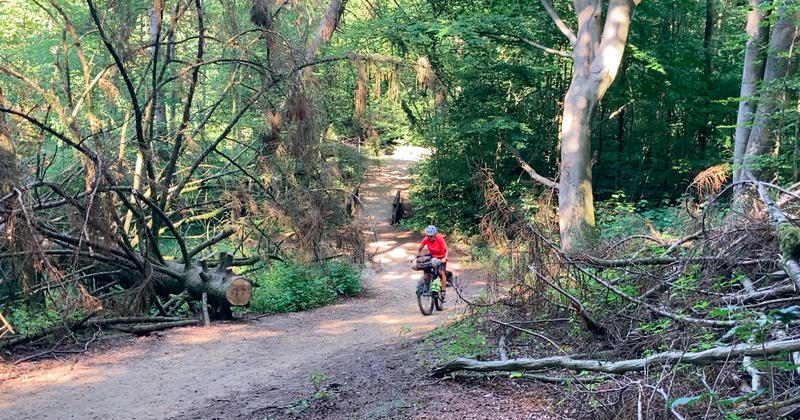
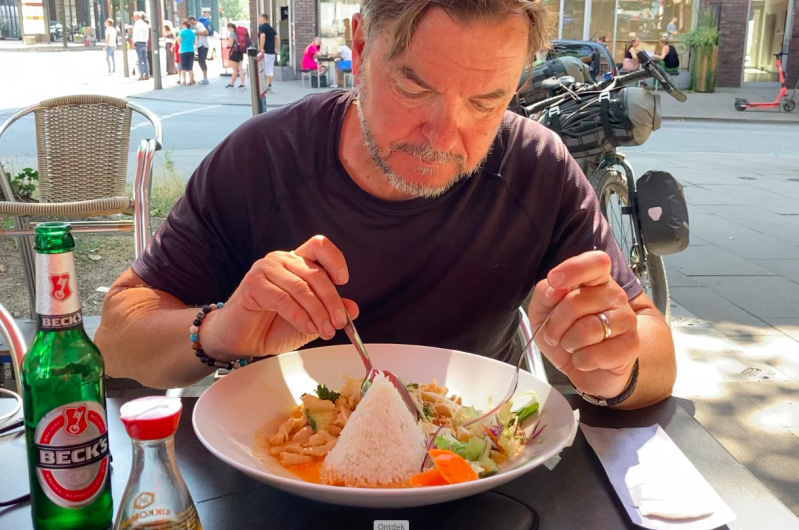
In the center of Hamburg we first buy a large gas can to cook on for the rest of the vacation and then sit down for a nice lunch at a Vietnamese restaurant. There are no campsites here and we want to experience something of this city. There are incredibly many hotels and at first we wanted to cycle around to get a better feel for the city and the different districts. However, it is quite a warm day and in the city a few degrees more. We don't really like the idea of cycling around, so we call a helpline and ask friends who recently took a city trip to Hamburg for advice. On their advice, we can limit our search to the districts of Aldstad and Neustad and ask at which hotels the bikes can be parked safely. So we ended up in a beautifully spacious room at Rubi Lotti Hotel & Bar where the bikes could be brought into the room.

The next morning we have breakfast at a bakery around the corner. When we are ready to leave, Roelie feels that her front tire has too little air. We are still nonos on tubeless and an empty tire should not be possible according to our limited knowledge. While Harry photographs his bike on the bridge, Roelie searches the Internet and decides to pump in some extra air, hoping that a possible hole through the latex will close by itself and take off.

On the route out of town, we see the tanzende türmen, the dancing towers above the trees of the park (where, by the way, relatively many vagrants spend the night).

With one of the 5 or 6 elevators in a row, which holds many bicyclists per elevator, we end up deep underground. The tunnel runs under the river Elbe. On the other side, the same large elevator takes us and many other cyclists back above ground where we cycle into the industrial port area. Next comes the Turkish suburb of Harburg, a beautiful city park and a number of hamlets with houses for the better off, and then the Lüneburg Heath lies before us.




The Lüneburg Heath is a wonderfully beautiful nature reserve that attracts many hikers and cyclists. We need to be careful, because we are not used to sharing the road anymore. This crowd is quite unique for a nature reserve. At least we manage to shoot some pictures without other people on them.
Lüneburger Heide Campground with lots of nature, greenery and space unfortunately has no room for us. That really makes no sense at all. But the man at the reception are adamant. Cycling back to the road we see enough space around the entrance/exit to put up the tent and we decide to return to the reception to ask if we can put up the tent there. The lady who is now at the reception looks reluctant but then hits the cash register and asks for € 15. The spot is also popular for picking apricots, dog toilet and is next to the "camper-dump-your-stinking-waste-water-are-out" spot. Not the best spot, but we're glad we don't have to go any further. There is a lot of space around us where we could pitch the tent. Before it gets dark the tent slides off the open field towards a forest strip where nobody will bother us, but we won't be surprised by dogs and their owners either.
A day later we cycle to the bike shop in Soltau to inquire in stammering German about the deflation of Roelie's tubeless front tire. The bike store is still closed this early in the day. There is a café open where we sit and wait and drink coffee. We are besieged by wasps. On the tables there are spray cans of water to spray the wasps away, but they are not very impressed by it and at most they move to the people a table away. We get away without stings, but the wasps seem to be a plague in this area.
The bicycle shop provides us with a large bicycle pump. We had already tried with our own hand pump and some latex bubbled out. The lady at the bikes says that this may indeed plug a hole, but it also may not. We'll find out.
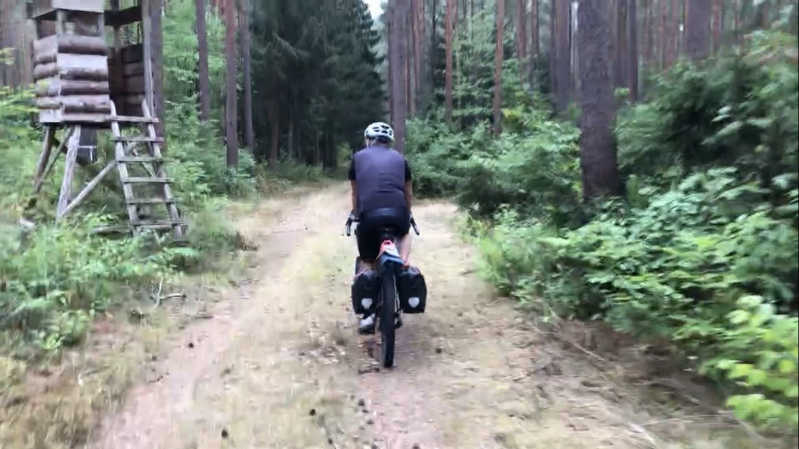
Further on in the woods a German couple asks us about the road we came from. We come from Bergen and at the next junction our eye catches a sign Belsen. We are close to Bergen Belsen, chills immediately go through your body. Not far from here, more than 70,000 people died in the concentration camp. So much suffering and atrocities in this beautiful setting. The guard shacks at altitude for hunters feel oppressive.
We pedal on through the forest with Roelie having another problem with her bike. Sometimes the pedal wants something else than her foot wants and tries to work against it and push her foot off, a variation on arm squeezing. As a result, by the end of the afternoon, the pedal flies off and eventually cannot be put back on.

We are at the campground near the village of Winsen and fortunately the village has a bicycle store. They even sell new pedals and the bicycle mechanic puts them on the bike for free. The night before we had joked that they would probably only have standard black pedals with reflective plates and yes, the new pedals are black with a reflective plate, but fortunately with the pins to have a little grip. The front tire, which is still slowly deflating, gets some air to get through the day.

We packed a wet tent and plan to spend the night in a hotel in Hanover. In a small village near an abandoned playground, we see a high slide, which turns out to be ideal for drying the tent. At that moment bikepacker Eliot arrives. He too has been following the EDT from northern Norway but has skipped much of it because he found it lonely and boring. We must confess, from the north of Denmark we also find the route somewhat monotonous and boring, with exceptions.
Arriving in Hanover, Roelie's tire is quite soft already and that makes steering more difficult. This is hard on technical sections, but certainly not safe in the city with other traffic. We find a bike store with rave reviews. The latex has not been bubbling for a while now and there is a small stone poking into the tire. The bike mechanic advises pulling the pebble out. Fortunately, the pebble has only punctured a small hole. The mechanic pours a bottle of latex into the tire and it works. The hole is plugged and we can continue without worry. In Hanover, the seed that Eliot planted finds its way and we also decide to leave the EDT after Hamelin. We are looking forward to a different kind of road and deviate from asphalt roads through farmland combined with gravel roads through production forest.
Before Hamelin we finally get to do some altimeter climbing again. On the climb we meet another EDT cyclist, the cheerful Dutchman Dion with his dog Kesho. Not bothered by the loneliness and dullness, he enjoys himself to the fullest and is going to try to cycle the whole route to the south of Portugal. If there is climbing to be done Kesho has to walk himself, when descending the seat in the trailer behind the bike is waiting. At the top we say goodbye and look forward to follow his adventures on Insta.
In Hamelin, we turn off and start following the Weserradweg along the river Weser. Campgrounds abound along this river whose water is a bit lower than normal. We read about the drought on the news, but now it is visible to us for the first time. Cycling along a river is indeed really quite different from the EDT.
Several times a ferry to the other side of the river Weser does not run because of the too low water. So does the ferry we had planned to a supermarket in the village of Bodenfelde. Not too bad because there is another ferry a kilometer away and it does run. That ferry is special. Via a cable the ferry is first pulled upstream and then pushed by the current to the other side. Simple but also ingenious.

The Gieselwerder campground is a few kilometers after the Bodenfelder supermarket, and we get a nice spot on the edge of the campground and overlooking the river.

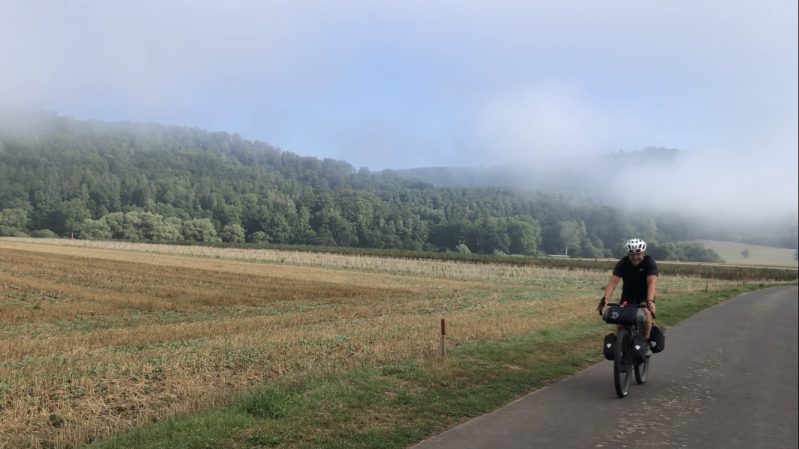
It takes a while the next morning before we can see anything of the surroundings. The fog is dense and dissolves with difficulty. So the dryness does come with dew and the tent is stuffed back into the bag soaking wet.

For some time we have been curious about the name of the town ahead of us; Hann. Münden. What does Hann. stand for? It turns out to be Hanover. It's not that exciting, but it is remarkable that it is abbreviated on every map and road sign. In Hann. Munden's marketplace we quietly drink a cappuccino. We eat the sweet snack that came with it in lesser peace while the wasps make a massive attack to grab some of the sweetness.
The man next to us drinking a cup of coffee without something sweet tells us Hann. is short for for Hanover. He enthusiastically tells us that great good fortune awaits us: in the next town of Kassel is the world-famous Documenta, the exhibition of modern art. Roelie figures out what and where and suggests we make a little tour through Kassel. Harry does not want to: it is hot and we have a fairly long leg ahead of us. As so often, doubt strikes: if we make the effort, it won't be worth it; if we let it pass us by, we might miss something spectacular. Kassel' s Friedrichsplatz is the center of the festival and turns out to be only a very short detour, so we decide to go. There we meet a very large parched lawn and tufts of people. There is little in the way of art and we quickly cycle on.
In Hann. Münden, we left the Weser River behind and cycled along the river Fulda. Just past Kessel we also leave the Fulda and follow the river Eder. Along this part of the Eder there are significantly fewer campsites than earlier along the Weser. Only at Lake Edersee is this compensated with a profusion of campsites, but Lake Edersee is far too far. We found a house that lets canoeists and cyclists camp in its garden and even offers something like breakfast. Unfortunately, we turn out to be the only ones. No one is home and a passerby suspects they are not going to be home either. There is no other campsite nearby, not even a hotel. We have already done 105 km today but there is no other option than to continue cycling to Fritzlar, a town 15 km away.

In the center of Fritzlar we find a lovely hotel. We take it and go to a super good Indian restaurant and then walk through the beautiful old town with a rich history. About 15 centuries ago Boniface founded the town by cutting down the sacred tree of the Chatti and using it to build a church. When no calamity befell him afterwards, he had proved that the gods of the Chatti did not exist and people converted to Christianity. Fritzlar grew into a religious place and played a role in many a war. The historic Marktplatz surrounded by the old half-timbered houses is wunderschön. We stop and drink a glass of wine on a terrace there and round off a hard day.

Lake Edersee is gone. Lake Edersee is/was a reservoir. Because the downstream Weser has a function for inland barges, there must be enough water there. And so the water from the reservoir is used. In a mini side lake, fish in panic gasp for breath. The otherwise floating jetties are on the ground at the bottom. All boats are removed from the lake. The tour boat docks normally where Harry is standing. The empty lake gives a gloomy feeling.
We cycle past the array of campsites, and we do so with pleasure, for they are all of those shacky-fixed-place campsites. Apart from the drought and the melancholy feeling, the bike route through the forest along Lake Edersee is beautiful. The route along the river Eder had not been so nice. After the Edersee, unfortunately, the route becomes less beautiful again. On a long straight stretch of bike path we hear an unfamiliar sound, one loud tick. Roelie sees Harry's rear wheel has a knock. We suspect where the noise came from: a broken spoke. We are lucky: only five kilometers away is a bicycle store and the mechanic has time to change the spoke immediately. Uninvited, he is also sets Harry's derailleur, which cannot be put in the smallest gear. He tells Harry to take a lap to test the adjustment. To our great surprise, he has found the right setting that previous mechanics said was impossible. We don't make many more altimeters, but the Germans sometimes make impossibly steep bits of bike path, so it's nice anyway.
Once again we spend the night at a campground with bad reviews on Google. The owner was an alcoholic and took poor care of the campground and of himself. He passed away and his son inherited the campground and the debts. Investment are necessary, but there is no money. We find a nice spot at the Eder bank on the field for tents (with one caravan there). Harry is lucky with a hot shower. Roelie is less lucky and showers cold. We knew from Google there was a big chance on that. More cyclists arrive and more tents on the tent field.
One of the cyclists lives in nearby Siegen. He bikes with his girlfriend to the Edersee to go swimming. We warn him that there is somewhat little water left. He advises us to leave the Eder route a little further on and continue towards Olpe. He helps us get a rough new route.
When we want to takeoff the next morning, Roelie rear tire is flat. We try what we can with our little pump but the latex won't sputter and the tire slowly deflates again. We don't dare to continue and then keep re-pumping. The next bike store is too far away. We return to the store where we went yesterday. One of the regulars at the campground offers to bring us by car. He needs to do some shopping anyway. The same mechanic as the day before helps us and puts a bottle of latex in the tire. There was indeed not a drop left in it. By car we return to the bikes, we thank the friendly German and can finally takeoff. The campsites near Olpe at the Biggesee are then out of reach, but we hopefully find something.
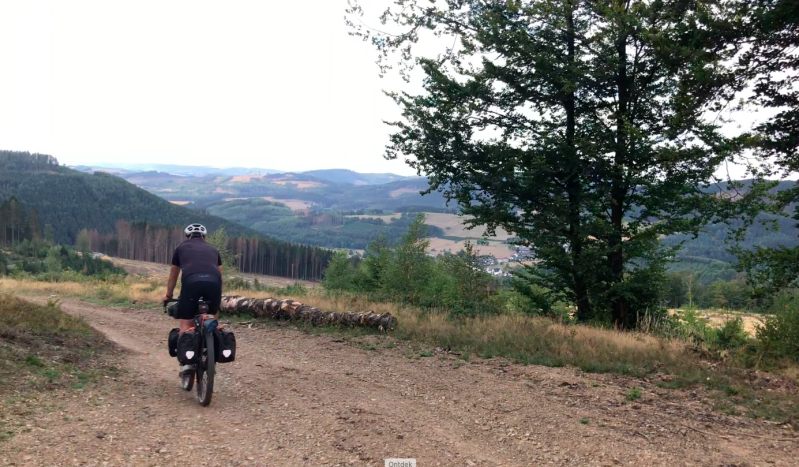
We turn off as recommended by the Siegener. We climb steadily up a hill and get a view of the Sauerland. In the descent we cycle past a slope with a ski hut.

Perhaps you noticed it in the previous photo: the barren trees. Germany is struggling with another nature problem besides the drought: the bark beetle. We already know the bug from when we cycled the Great Divide. Also in the USA, this super little critter has affected gigantic forests. So now it is also infesting the forests of Germany.

It is only August and because of the drought, these chestnut trees are dropping leaves in the struggle for survival.
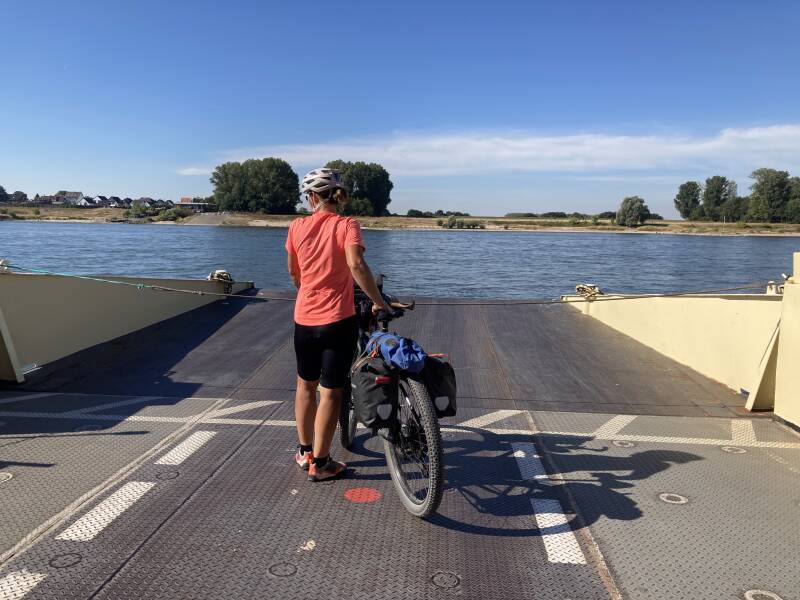
Water! The Rhine appears to still have plenty of water and a ferry takes us across. It is still early but already quite hot. We decided to take the shortest route home and started early in the morning, hoping to make it to Venlo. We can't find a campsite around Venlo. It also turns out to be just a bit too far for this hot day. Through Airbnb we find a room with air conditioning somewhere in the countryside just before the border. One more barbeque, one more sleep (in a waterbed) and one last stage and that's it.
Neither of us knew the part of Germany we cycled through. We cycled very nice but also very boring parts. Cycling along the rivers was different. Along the Weser was nice, but rather busy. Perhaps in hindsight we should not have left the EDT at Hamelin.
Germany is known as a highly developed country. The number of vagrants in Hamburg was striking. Also notable is the use of cash. Stores are closed on Saturday afternoons and Sundays. It seems like a step back in time. Many people smoke and the vending machines everywhere make availability low key. The restaurants offer mainly (a lot of) meat. There are fewer electric cars and more electric bicycles. Men like to bike, walk and garden bare-assed, often with a tanned beer belly. Railroad trees go down 5 minutes before a train passes. At one crossing we had to make a call to ask if the barrier could be raised. Unfortunately, no one answered and we crawled under the barriers with our packed bikes.
From English we switched to stammering German. Mouth caps are no longer mandatory in the Netherlands and Scandinavia. In Germany, the mask is still mandatory on public transport and in some stores, with occasional requirements for the type. Even in stores without a requirement, a quarter of customers wear a mouth mask,
There are far too many RV sites and in the few campgrounds there are too many sites for regular guests. This makes camping a little less fun. Still, the varied landscapes, historic towns and that one excellent mechanic made it another unforgettable trip.

